NEW YORK (RNS) — Celebrated from Dec. 26 to Jan. 1, Kwanzaa is centered on seven principles that champion the uplifting of the Black community.
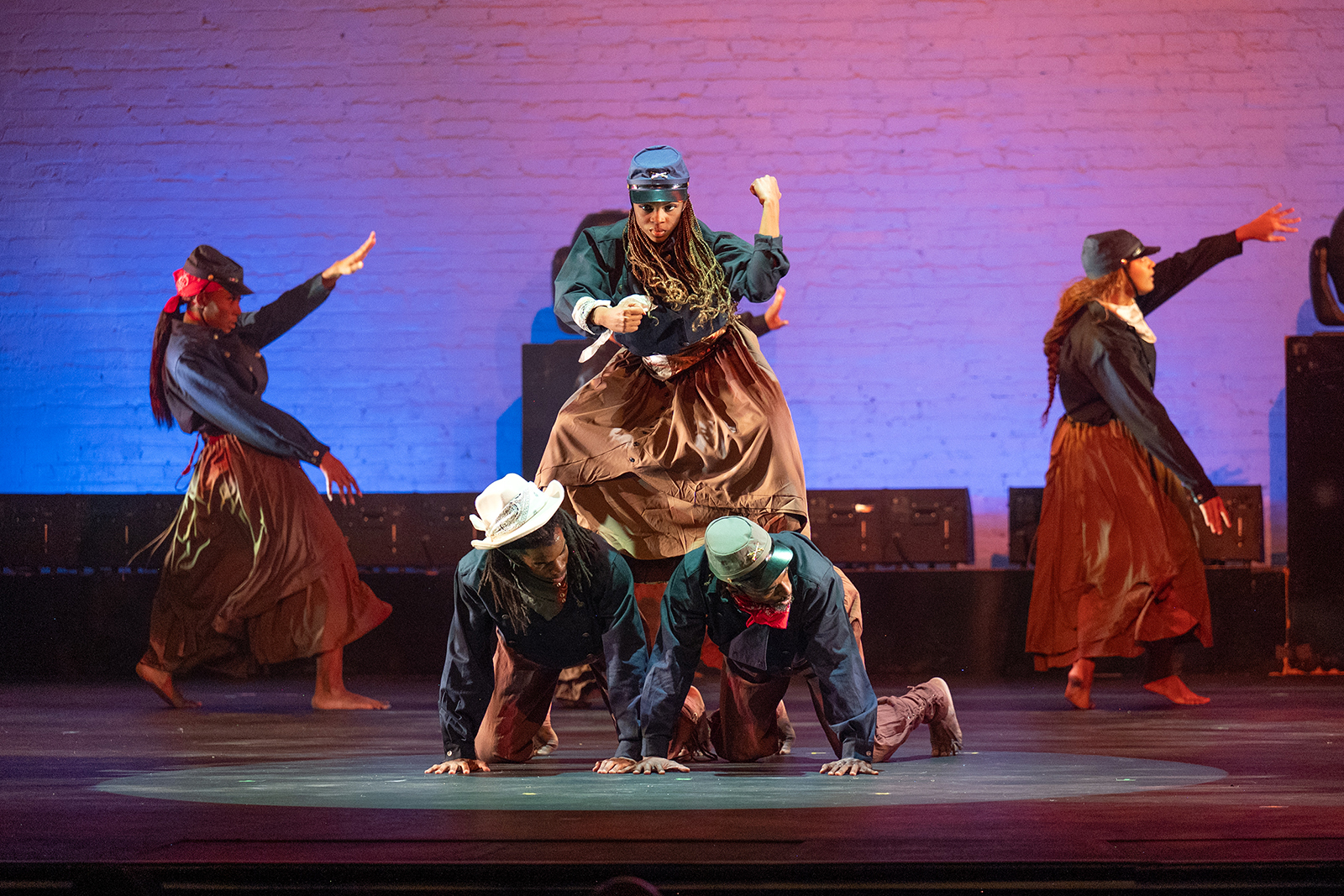
Dancers perform “Black West,” a new segment of “Kwanzaa: A Regeneration Celebration” at the Apollo Theater in New York, Dec. 21, 2024. (Photo by Shahar Azran/The Apollo)
Fiona André
December 24, 2024
NEW YORK (RNS) – Harlem’s Apollo Theater presented the 17th edition of its annual Kwanzaa spectacle, “A Regeneration Celebration,” on Saturday (Dec. 21), a two-hour dance performance celebrating Black identity and bringing to life the spirit of the holiday based on Black American history and culture.
The Apollo’s Kwanzaa celebration returned with an updated show from the award-winning Harlem troupe Forces of Nature Dance Theatre. The spectacle, the largest Kwanzaa celebration in New York, evokes the ideas and rituals of African spirituality to the beat of African drums.
“What we do on Kwanzaa is we give a chance to people to see who we are. Kwanzaa is the spirit of Africa born here in America,” said Forces of Nature’s co-founder, Olabamidele Hart-Husbands, who hosted the show.
Created in 1966 by Africana studies professor and civil rights activist Maulana Ndabezitha Karenga, Kwanzaa was designed as a “Black alternative to Christmas” and is estimated to be observed by 3% of Americans.
Celebrated from Dec. 26 to Jan. 1, Kwanzaa is focused on seven principles, or nguzo saba in Swahili, aimed at uplifting the Black community: umoja (unity), ujima (collective work and responsibility), kujichagulia (self-determination), ujamaa (cooperative economics), kuumba (creativity), nia (purpose) and Imani (faith).
“These are the seven living principles that we experience 365 days a year,” said Hart-Husbands as she greeted the audience.
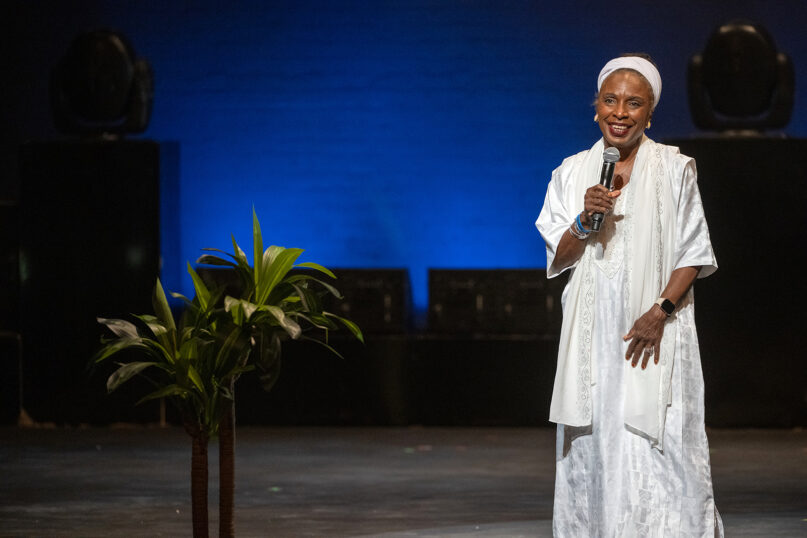
Olabamidele Hart-Husbands hosts “Kwanzaa: A Regeneration Celebration” at the Apollo Theater in New York. (Photo by Shahar Azran/The Apollo)
Each night of the holiday, participants light a candle, representing one of the principles, in the Kwanzaa candleholder, which is called a kinara. Typically, it features three red candles and three green, plus a black one at its center representing umoja, or unity. Kwanzaa meals often feature yams, okra and sweet potatoes, emblematic food of the Black diaspora. It is also customary to eat collard greens to bring money and good fortune and black-eyed peas for good luck.
After illustrating the meaning of each principle, Hart-Husbands encouraged the audience to adopt Kwanzaa’s spirit and make an effort to celebrate. “I don’t care if you have to make your own candleholder and paint white candles red, black and green, but please do something!” she joked.
The spectacle started with a spiritual moment led by Husbands-Hart. Crouched at the front of the stage, dressed all in white with her long black locks wrapped in a white turban, she poured water to the ground in a solemn gesture to honor the ancestors. Kwanzaa, she said, is an occasion to show gratitude for the blessings they granted throughout the year.
“We thank the ancestors because we wouldn’t be there without them,” she said. Looking ahead to 2025, she encouraged the audience to remain faithful. “Know the ancestors have already said yes. Listen to the ‘yes’ of your ancestors.”
Throughout the show, the host addressed the audience saying, “Asé?” The public responded, “Asé.” An ancient Yoruba word, “Asé” is used to lend authority to a sentence, and is often employed by practitioners of the Afro-Brazilian Candomblé faith.
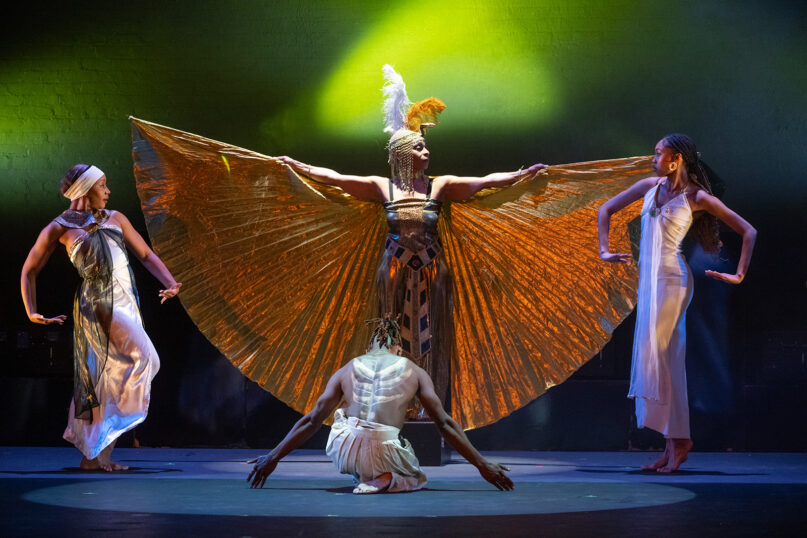
A “Hesi” prayer is interpreted by performers in “Kwanzaa: A Regeneration Celebration” at the Apollo Theater in New York, Saturday, Dec. 21, 2024. (Photo by Shahar Azran/The Apollo)
The opening dance represented a “Hesi” prayer, a series of incantations addressed to an ancient Egyptian divinity to awaken the divine spirit within the audience. On stage, eight dancers dressed in white, some adorned with white body paint, moved around a Pharaoh-like figure. The scene culminated in a protective embrace, with all dancers kneeling at the feet of the royal Egyptian.
Forces of Nature Dance Theatre’s choreography is rooted in ancient spirituality, honoring Nigerian Yoruba deities and Caribbean Taíno mythological figures. Co-founded in 1981 by choreographer Abdel R. Salaam, whose work revolves around “environmental health, spirituality, and the survival of life on earth,” its repertoire is a fusion of traditional West African dance, Afrobeat, contemporary ballet, house and hip-hop.
In recent years, Forces of Nature has received the Apollo Kwanzaa 50th Anniversary Award in Excellence and the Kuumba Award from the New York Kwanzaa Holiday Foundation.
This year’s show featured a new dance set to Quincy Jones’ 1974 “Soul Saga (Song of the Buffalo Soldiers)” in honor of the memory of the legendary producer, who died in November. “Black West” depicts the history of Black Americans who journeyed to the West in the 19th century.
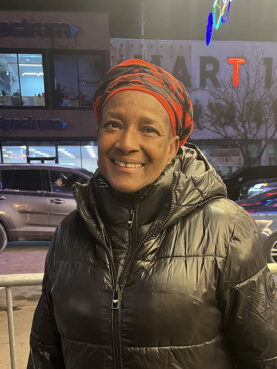
Jonetta Tillery at the Apollo Theater. (RNS photo/Fiona André)
Halfway through the show, elders of the community, each paired with a young child, performed the “ritual of nation-building.” As they came forward, each child danced or sang, or even talked about trigonometry, before receiving a glass brick to place on a model city. The gesture, explained the Rev. Malikah Lee Whitney, a Harlem native who runs the youth program Double Dutch Dreamz, marks their commitment to “build and contribute to the advancement of the Black community.”
For Jonetta Tillery, passing the love for Kwanzaa to the younger generation is also her favorite part about the holiday. At 71, Tillery has celebrated since childhood and appreciates Kwanzaa’s emphasis on Black history.
“It’s a great thing when we take pride in what we do and what we know as a race of people of color. We have done so many great things, we need to appreciate each other and continue to teach each other,” she said.
A lifelong resident of Harlem, Tillery said she has many wonderful memories of the Apollo. She remembered seeing the Jackson 5 for the first time in August 1967, when the group won “Amateur Night,” the Apollo’s talent show that jump-started their career. Since attending the Kwanzaa celebration last year, she said, it’s become a new tradition for her.
Unlike other year-end holidays that compel people to spend money, Tillery said Kwanzaa isn’t about material things and doesn’t require much. Her own Kwanzaa celebrations include family meals and time serving the community, she said.
“It’s more about love and how we communicate it with each other through music, dance, through joy, through unity, and teaching one another how to take care of each other,” she said.
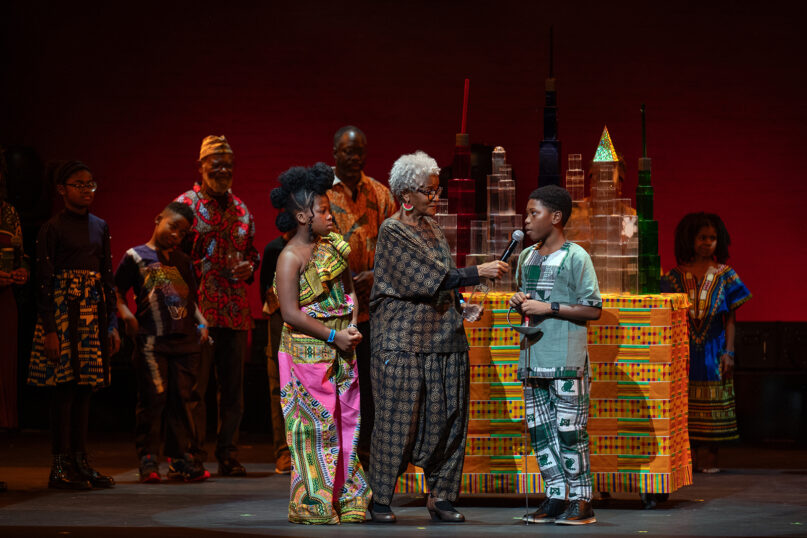
Elders and children perform a ritual of nation-building in “Kwanzaa: A Regeneration Celebration” at the Apollo Theater in New York, Dec. 21, 2024. (Photo by Shahar Azran/The Apollo)
No comments:
Post a Comment